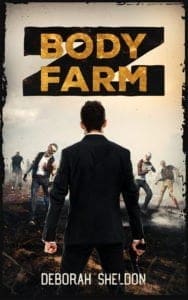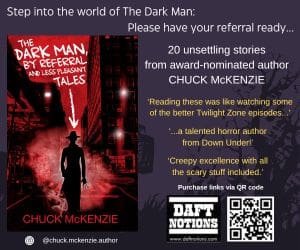10 Most Hated Zombie Clichés

Okay, maybe hate is a strong word – how about “over-used”? When I decided to write my zombie novel, Body Farm Z, the first thing I did was make a list of every trope I wanted to avoid. I checked online for other people’s opinions too. Only then did I start blocking out my plot. And guess what? I still have that handwritten list in my novel’s research folder. Here’s my opinion – and yours may differ – on the ten most well-worn clichés:
- The apocalypse happens in the USA
Americans are incredibly adept at documenting their own culture. The West is dominated by their movies, TV shows and fiction. (Which are often terrific – I’m not complaining.) So, no surprise that almost all zombie stories are set on US soil. This cliché was easy to sidestep because I’m an Aussie. The events in Body Farm Z play out in an area just a few hours’ drive northeast of my home, in the bushland that lies beyond metropolitan Melbourne.
- Cities, supermarkets and shopping malls
Of course, I get it: setting zombie stories in urban environments gives the writer a lot of scope. With access to food, cars and guns, the characters have options. But I decided to set my story in an isolated facility without a street address. To find my forensic body farm, you need to key its longitude and latitude into your GPS – but only a limited number of people know the coordinates.
- Superhuman strength in a rotting body
As a health and medical writer for many years, this one bugs me. A fit man in his prime could no more fight his way out of a buried coffin than leap over a tall building in a single bound. Not only that, the decay process begins soon after death, which means a zombie would automatically be weaker than the average living person. I kept biology in mind while I was writing, and considering my fascination with human physiology, did I have a choice?
- Characters can’t outrun a shuffling corpse
Generally speaking, people don’t tend to fall over very often. Can you remember the last time you took a spill? Yet able-bodied characters in zombie stories are forever tripping up so they can lie screaming on the floor while zombies converge. Twisted ankle, anybody? It’s a well-worn and hoary staple of horror movies overall. I’m sure that no one in Body Farm Z falls over. Pretty sure, anyway.
- The ubiquitous chainsaw
This one is right up there with the cliché of never-ending bullets. Actually, one of my characters happens to own a chainsaw – he’s the caretaker at the body farm, which is set in the bush with plenty of eucalypts, paperbark and wattle trees – but uh-oh, the chainsaw is unfortunately at the shop getting repaired when all hell breaks loose. What a shame.
- The defence forces are defenceless
The military forces, particularly in the US, are well-armed and formidable…until a zombie apocalypse occurs. Then, the military is next to useless or, even worse, somehow complicit. Happily, I didn’t have to worry about this cliché. The action in Body Farm Z occurs at the facility and takes place fast – over the course of just two hours.
- A bitten character hides their infection
There are variations, including a character hiding from the other survivors that their loved one – typically a spouse or child – is infected from a zombie bite. I turned this cliché on its head. When one of my main characters becomes “zombified”, cataloguing the stages of transformation using his own deteriorating point-of-view both challenged and satisfied me.
- The annoying guy who always takes charge
Ah yes, the character you apparently love to hate. His ultimate death-by-zombie is supposed to make you cheer. I avoided this trope completely. Along the same lines, I didn’t have any characters making overtly stupid decisions. (How many times have we seen the girl in a house of horrors run upstairs instead of out the front door?)
- Oh no, the real monsters are actually us
Many zombie stories are an allegory for the breakdown of society. And while it was a cool theme at first, the notion that “humans are the scourge of the earth” is now commonplace. (I don’t know about you, but I’m sick of being told I’m some kind of parasite.) My take was to internalise the zombie allegory and explore a range of psychological issues such as identity, self-image, sanity, family relationships, and social isolation.
- “What the hell are those things?”
Oh man, this is my greatest bugbear – how come characters in a zombie story don’t have any idea what zombies are? What alternate universe are they living in? Half the plot is taken up with the characters trying to figure out what we, the readers and viewers, already know. In Body Farm Z, the first time a zombie appears, one of my characters yells, “It’s a zombie!” And soon after comes the sage advice, “Shoot it in the f*cking head!”
 BODY FARM Z BY DEBORAH SHELDON (SEVERED PRESS)
BODY FARM Z BY DEBORAH SHELDON (SEVERED PRESS)
Available on: Amazon
To solve murders, you must understand the process of decomposition. Australia’s newest body farm, the Victorian Taphonomic Experimental Research Institute, is hidden in bushland some four hours’ drive from Melbourne. Scattered across its 150 acres are human donor cadavers and pig carcasses arranged to mimic some of the ways in which police might find murder victims: exposed to the elements, buried in a shallow grave, wrapped in tarpaulin. Forensic scientists and graduate students meticulously track each stage of putrefaction. Today, Detective Rick Evans of the Homicide Squad is at VITERI for the re-creation of one of his cold cases. A human donor will be locked inside a car. But the donor has other ideas… So begins a facility-wide outbreak of the reanimated dead.
Deborah Sheldon
Deborah Sheldon is an award-winning author from Melbourne, Australia. She writes short stories, novellas and novels across the darker spectrum. Some of her titles include the horror novels Body Farm Z, Contrition, and Devil Dragon; the horror novella Thylacines; and the collections Figments and Fragments: Dark Stories, and the award-winning Perfect Little Stitches and Other Stories (Australian Shadows “Best Collected Work 2017”). Her short fiction has appeared in Quadrant, Island, Aurealis, Midnight Echo, Breach, AntipodeanSF and many other well-respected magazines. Her fiction has been shortlisted for numerous Australian Shadows Awards and Aurealis Awards, long-listed for a Bram Stoker Award, and included in various “best of” anthologies. Other credits include TV scripts, feature articles, non-fiction books, stage plays, and award-winning medical writing. Visit her at deborahsheldon.wordpress.com
- About the Author
- Latest Posts
Stuart Conover is a father, husband, published author, blogger, geek, entrepreneur, horror fanatic, and runs a few websites including Horror Tree!











Funny and entertaining piece